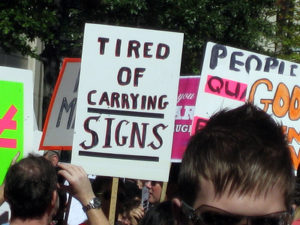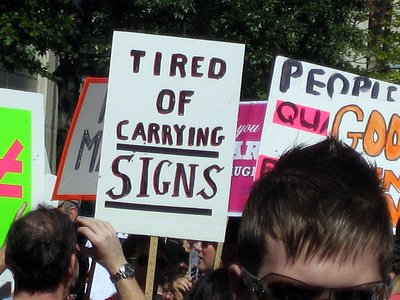Beyond Story Battles 1: Living For The Fight?
 Pick a protest, any protest. Right now we have at least two popular ones from which to choose: the “Tea Party,” for political conservatives, and the “Occupy [Whatever],” for the other guys. Must be a pack of fun. You get to run around and yell, do some rage, react, or even (depending on who you listen to) be a deep dark hidden evil sick racist, or Marxist.
Pick a protest, any protest. Right now we have at least two popular ones from which to choose: the “Tea Party,” for political conservatives, and the “Occupy [Whatever],” for the other guys. Must be a pack of fun. You get to run around and yell, do some rage, react, or even (depending on who you listen to) be a deep dark hidden evil sick racist, or Marxist.
But for a term like protestors, has anyone noticed that a lot of their rhetoric is actually anti? Anti-this. Anti-that. Reaction-based response. Much less in support of anything.
I don’t mean I have some expectation that protestors should offer detailed alternatives or else shut up. Even general pro-something-ism isn’t common. Who walks up to most protestors, asks why they’re there, and hears: “Oh, I’m just thrilled to be with people like me; I think that if we all get together, we can do great things! Hm, and I guess that also includes opposing our enemies.” More likely you instead hear first about the Enemies. How evil they are. How they even eat babies. And kittens. And baby kittens.
Sure, some of those enemies are rotten. (I don’t mean to imply I’m completely Neutral here.) But is that any person’s destiny, both in an eternal sense and a temporal sense? To fight, fight more, wage ideological war, sometimes break things — Anti, Anti, Anti?
‘They fight, and bite …’
 I’m reminded of Megamind, the giant-blue-headed genius in the 2010 movie of the same name. He spends his life fighting Metro Man, a Superman-like hero, based mainly on the fact that every hero needs a villain. But secretly Megamind actually admires the hero. That is revealed when Megamind, wildly and accidentally deviating from the usual script, actually wins, defeats Metro Man, and finds that he’s taken over the city — then has no idea what to do with himself. He lived only for the fight, not actually winning it.
I’m reminded of Megamind, the giant-blue-headed genius in the 2010 movie of the same name. He spends his life fighting Metro Man, a Superman-like hero, based mainly on the fact that every hero needs a villain. But secretly Megamind actually admires the hero. That is revealed when Megamind, wildly and accidentally deviating from the usual script, actually wins, defeats Metro Man, and finds that he’s taken over the city — then has no idea what to do with himself. He lived only for the fight, not actually winning it.
I’m also reminded of some rhetoric — not all! — that I see in Christianity, and to bring things closer to home, even some rhetoric about Christian visionary stories and novels.
Becky’s column last Monday reminded me of a recent example. She quoted freelance writer Tony Woodlief’s criticism of Bad Christian Art. Starting with a secular critic’s question (I can’t help but ask: how come anyone buys unqualified stock shares in them anyway?) Woodlief had faulted Christian fiction, and Christian movies in particular, for offering cheap plot resolutions, characters, and sentimentalities.
Some of what he said is very agreeable: for example, that “bad art derives, like bad literary theory, from bad theology.” Absolutely. Bad anything derives from our bad theology. Moreover, consistently applying that bad theology makes things even worse.
Yet I’d point out that this is the point: our beliefs should start with theology — theology proper, meaning “study of God.” They don’t start with Study of Sin. Or Enemies. Or Antis.
Meaning: our ultimate goal in Life, the Universe, and Everything, is not: We Must Fight.
If we do make the battle-centered life our goal, even subconsciously, without reminding ourselves why we hope to end the fight, one or more of these symptoms may plague us:
1. We’ll be nearly unbearable jerks. In churches, politics, organizations, families, and creative circles — including fiction — it will be clear that all we want to do is fight the Bad Guys. Not only do we fail to have love or respect for them at least as noble opponents (as Megamind truly thought of Metro Man), we have no vision for what, exactly, would happen after even good fights are won.
2. We’ll automatically act as though our chief end is to avoid Bad Things forever. God, instead of being our chief end, the One we proactively desire to glorify and enjoy forever, is turned into a means to other ends. Hijacking Him for goodness-based battles is just as bad as hijacking Him for evil choices.
3. Our stories will stink. I sincerely believe a lot of Christian-fiction criticism could be resolved, not by harping constantly on how our stories aren’t Gritty or Realistic enough, but by putting both showing-real-evil and the happy ending into Biblical perspective.
As I noted last Monday, those who claim to expect all Christian art to include the full Gospel, with “total depravity” and all, don’t apply this to the Bible itself. They couldn’t. If they did, every Psalm would be required to undergo a Gritty Reboot™, to ensure none of them sang exclusively about how great God is and how His wondrous creation praises Him, without also including Realistic Evil. Why try to be more spiritual than God?
4. Worship and rest will make no sense. Yes, “prosperity gospel” and saccharine faith notions are far too common. Christians must oppose them. The real Gospel is better.
But some, seeing a need to fix only those problems, are overcorrecting with implications or statements that all Christians should ever do is prepare for suffering. Or we bemoan our present lack of suffering (why don’t I suffer as much as Persecuted Believer X in another nation?). Or we base our beliefs and actions on goals of being only Gospel carriers — as if fulfilling the Great Commission and teaching all that Christ commanded us (that is, all of the Bible!) includes only the tell-others-to-repent-and-believe parts.
Rather, all of Christ’s commandments include the truth that sometimes He gives us rest. Sometimes He gives us material blessings. And He commands us not just to distribute the Gospel and try to sign up other distributers, multilevel-marketing-style, but to worship Him and enjoy Him even now, through all that we do, even before He returns.
 5. In theory, everlasting life would be boring. I’ve asked this question before. When I used to waste more time either with cultural-only “fundamentalist” Christians, or else liberal “emergent” Christians, I’d phrase it this way: “Imagine what would happen if, in all your zeal to Fight the Good Fight and that’s it, you die and end up in Heaven. There, you would find nothing to fight. No poor people to feed. No heresy to condemn. Nothing that makes you feel or act like a Warrior as an end to itself. All you’d have left to do is worship Christ in other ways, be it music or work, exploration, artistry, learning and more. In such a place, when all our vestiges of self-as-savior are gone and there is only one Savior of us all, are you sure you would not be bored?”
5. In theory, everlasting life would be boring. I’ve asked this question before. When I used to waste more time either with cultural-only “fundamentalist” Christians, or else liberal “emergent” Christians, I’d phrase it this way: “Imagine what would happen if, in all your zeal to Fight the Good Fight and that’s it, you die and end up in Heaven. There, you would find nothing to fight. No poor people to feed. No heresy to condemn. Nothing that makes you feel or act like a Warrior as an end to itself. All you’d have left to do is worship Christ in other ways, be it music or work, exploration, artistry, learning and more. In such a place, when all our vestiges of self-as-savior are gone and there is only one Savior of us all, are you sure you would not be bored?”
Naturally, I have to ask that question of myself. I wonder if my own habits and even writing style give that impression. This is likely why I’m drawn back to fiction. Unlike a steady diet of, say, doctrinal or apologetics materials, fiction helps with the humility. I can’t just use a story for spare parts for my own Battles. I’m instead confronted with a world, with people, making completely different choices. It’s not my story; it’s theirs.
And that implicitly, or explicitly, reminds me that life isn’t my story; it’s His. My mission is not only to win against the bad guys — even the really irritating ones who deny Hell or claim we must support only shallow stories — but to delight, proactively, in Him.
Visionary stories, then, are not merely a means of Battling against Christian novels with shallow themes, or without cusswords, violence, or dungeons and dragons. They are a means of worship — or, I suggest, they should be. True worship doesn’t get salvaged for parts to build the latest Christian-industrial-complex weapon. (I must keep reminding myself of that!) Instead, worship is a means only to God, to enjoying Him personally.
So, those could be a bunch of antis of my own. We shouldn’t fight for fighting alone; in fact, we should fight against the inclination to fight all the time with no victory in sight. By itself, that’s completely self-refuting. It needs emphasis on the pro-reasons why we fight any battles, or enjoy visionary fiction, or do anything. However, I’ll save the pro-reasons for the near-future Beyond story battles 2: anticipating the After-world.
Thus, when the series is done, both will be best read together, just as one should take into account all of God’s big Story, and our smaller ones. Sure, we shouldn’t skip over the battles and our need to fight them. But we also should not confuse those temporary means for the everlasting Chief End.











































I agree with your points here, Stephan. But how does this apply to fiction, if at all?
At least one quote above demonstrates the kind of only-anti-based rhetoric, specific to Christian fiction, to which I refer. Yet others can be found, scattered about the Christian spec-fic blogosphere, some intentionally basing arguments for better fiction only on antis, and others that merely give this appearance. (Sometimes I wonder where my own views on the subjects give the appearance of the anti-only evils!)
My hope was not to name any names, or authors, or publishers. That would not only defeat my whole point, but could be un-Christlike at the same time. Instead I hope to discuss the issue in more general terms. Some conflict is necessary, sure. But it is temporary. All conflict will die with our Old Earth. By contrast, joy and worship of God — which includes our fiction offerings both now and very likely also in the future, physical New Earth! — is everlasting.
Well, I got a little confused as to your point there, because your topic works on both a reality level and a fictional reality. For instance,
“1. We’ll be nearly unbearable jerks.
2. We’ll automatically act as though our chief end is to avoid Bad Things forever.
4. Worship and rest will make no sense.
Those all apply to a fictional story universe, as well. A story with all conflict and no reason for it winds up with 1, jerky characters, 4, no point toward which the conflict is working, and 2, using God to pull all the punches. (I’ve seen that done before … it doesn’t often work.)
Also you wind up with the nonsensical battles in the Tough Guide to Fantasyland, and in its accompanying novel, the Dark Lord of Derkholm. Conflict for conflict’s sake is hard on a fantasy world. 🙂
This is a difficult issue for a writer, because conflict is an essential element of fiction, and it’s hard not to frame everything in terms of the conflict that will make it interesting. Without conflict, we’re left with a narrative of life in which nothing much happens. John gets up, goes to work, comes home, and goes to bed. Rinse and repeat, because there’s nothing to stand in his way or cause him trouble. It’s a pleasant, peaceful life, and I can provide as much descriptive detail as I care to include, but nobody will want to read the story.
In our experience, the end of hostilities marks the end of the tale. Frodo sails off into the West with the elves, and we usher in the Age of Man with taller hobbits and plenty of farming on the horizon. Huzzah. A few minutes later, we’re scanning the TV Guide for the next episode of Game of Thrones.
Eternal life in the New Earth can’t be boring, by definition, because it’s the fulfillment of everything we’re meant to be as children of God, but I think stories will have to change as much as we do, and I confess I have difficulty imagining what that might mean.
That’s a subset of the issue I hadn’t though of. In this, I’m more thinking about how we search out Christian speculative stories, or market them, ourselves — the whole book as a product, and not necessarily how its actual story goes.
Completely agree. Thus the “theoretically” above. Theoretically, what if someone who bases his life (or fiction recommendations) on an anti ended up in New Earth, or the present Heaven, with no more fights to fight, but instead only worshipful, God-honoring, eternally fascinating challenges?
My theory is that we will be able to have many of the same kinds of stories, with conflict at all. It’s based on the principle of continuity between this Old Earth and the New one. We’ll still remember sin, its horrors, and thus feel even more gratitude toward the After-world’s King. Thus I suppose that we’ll be able to “set” new stories on the Old Earth, with all the conflict and rules and those structures. Of course, they’ll all be historical fiction!
Sigh. <Heads for the library to brush up on his Michener and Clavell> 🙂
A very good reminder of the reality that is so easy to forget
Let it not be forgotten, however, that many Christians have gone to their graves standing for the truth and knowing the battle was one they would not win. At least, not in this lifetime. They took a stand and chose the hill they would die on. They said, “that is wrong,” and were slain for it. So while we must always be for something, sometimes the only reason we need to fight is for an anti. You may not kill six million Jews, Hitler. John the Baptist said, Herod, you cannot have your brother’s wife, and he got an impromptu neck fitting with a blunt ax. In a story, sometimes the greatest, most moving tale can be the one where the good guys are forced to walk into certain death with no hope of coming out alive. Sometimes all you can do is keep fighting.
So I think there is a place for that sort of story in the Christian life. It reflects that – this side of life – we do not know all ends. St. Augustine said that the difference between God and man is a matter of perspective; the Christian life is like wandering through a deep valley with great bends and turns in the road that obscure our ability to see around the next turn. God, however, is like a man standing at the top of a great tower overlooking the whole valley and can see why the bends and twists are there.
Great reminders, Stephen, and ten points to Griffyndor for using Megamind and for putting “We’ll be nearly unbearable jerks” as the first point. Speaking as a former completely unbearable jerk, it’s so important to be aware of this.
I kept meaning to get back to your comment, Adam. By the way, due to a certain “unholy” day this Monday, I’ve postponed this column’s sequel in favor of another.
Exactly — and yet they knew it would be won, in the future, and didn’t spend their whole lives fighting the same fight or feeling bored or directionless if they couldn’t fight.
Most Christians who find themselves in the worst conflicts, at least from what I’ve read, have the most Biblical views about them. They don’t mistake the means for the ends. They will fight and suffer and even die, because the cause is right, and because the battle has been thrust upon them — they were not discernment “chicken hawks.”
And I would fight for those kinds of stories, though not because I can’t stand any story that’s not like that, but because this is among the best kind of story, and we need more.
I myself have now achieved the rank of only partly unbearable. Hoping to earn enough points to level up, though of course I shouldn’t be the one “earning” them (Phil. 2: 12-13). However, I’d appreciate the compliment more if you actually said it in the voice of Prof. Snape, though of course a) I can perform this impression on my own if necessary (and it is), b) Snape certainly would not say “ten points to Gryffindor.”
Finally, for this comment, Fred Warren offered here a succinct summary of this topic, specifically as it applies to those who yearn and fight for better Christian fiction: